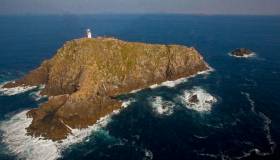Displaying items by tag: Blacksod
A local community in eastern Co Mayo rallied to attempt to save as many as 13 common dolphins that live-stranded near Blacksod on Friday (13 August).
As Mayo IWDG’s Facebook reports, the family group comprising 13 dolphins — mainly mothers and calves with a large male — stranded at Tarmon Beach with the tide dropping.
Sadly three of the dolphins died before they could be helped, but the rest responded to being cooled with buckets of seawater by local volunteers assisting the area’s Irish Whale and Dolphin Group (IWDG) members.
As the tide was still dropping for over an hour, it was quickly decided to move the dolphins 2km by road to the slipway at Blacksod where they could be more easily immersed and cared for.
The local IWDG team used their new wheeled dolphin stretcher to transport the larger marine wildlife to a horse box, while the juveniles were carried in beach towels.
Once carefully released back into the water, all were seen to swim quickly and without obvious distress, and by 9pm the pod had left the area.
“Tarmon and the surrounding beaches on the east side of the Mullet Peninsula are notorious for common dolphins live-stranding due to the topography of the beaches,” Mayo IWDG said.
“The beaches are large flat expanses so during spring tides especially, the water can level can drop uniformly and recede up to 1km in parts. Common dolphins being an offshore dolphin species often get caught out on such difficult-to-navigate shallow terrain.
“When a dolphin live-strands it puts immense pressure on their bodies. They can become very disorientated and have muscle spasms from the stranding event making it difficult to swim, which is why this group were given recovery time at Blacksod before being released.
“Thanks again to everyone who helped out today; it was so humbling to see everyone work together to get this pod back to the sea.”
 Juvenile dolphins cooled down with wet towels and seaweed were given recovery time with their pod before release | Credit: Mayo IWDG/Facebook
Juvenile dolphins cooled down with wet towels and seaweed were given recovery time with their pod before release | Credit: Mayo IWDG/Facebook
Elsewhere, the IWDG reports on two separate strandings of Sowerby’s beaked whales in Co Galway. The first was found washed up on Inisbofin at the end of the week while the second was reported yesterday (Saturday 14 August) across the water in Cleggan.
Commenting on the former report, the IWDG said: “Beaked whales are not stranded that frequently but this individual had evidence of rope marks on its body.
“As [they are] an offshore deep-diving species we don’t expect beaked whales to get entangled in fishing gear or interact with offshore activity.
“Maybe these rope marks were not from fishing but some other source. Hard to tell, but without a full post-mortem examination the cause of death will remain speculative.”
#Rescue116 - The Irish Lights vessel Granuaile is in Galway preparing to join the search for the missing crew of Rescue 116, according to Galway Bay FM.
The multifunctional vessel, built to operate in difficult sea conditions, is being stocked with additional equipment ahead of a major search of the crash site off Blacksod in Co Mayo scheduled for tomorrow (Sunday 19 March) with the forecast of improved weather conditions.
TheJournal.ie reports that what’s believed to be wreckage from the Sikorsky S92 helicopter has been found on the island of Black Rock, west of Blacksod, but there are no signs of a crash having occurred at that site.
The coastguard helicopter’s black box was also detected on Wednesday (15 March) near the island, but divers have been prevented from reaching its location due to the poor weather and sea state.
Three crew – chief pilot Mark Duffy and winch men Paul Ormsby and Ciarán Smith — remain missing after the incident in the early hours of Tuesday (14 March) as the Dublin-based Irish Coast Guard helicopter provided top cover for a medevac.
The funeral of Capt Dara Fitzpatrick, who was taken from the scene in the first hours of the search and rescue effort, takes place this morning (Saturday 18 March).
Meanwhile, it emerged on Thursday (16 March) that Rescue 116 was tasked to the scene on Tuesday after the Irish Air Corps was unable to provide assistance due to reduced capacity, according to The Irish Times.




























































